Erstellt am: 24. 11. 2011 - 10:00 Uhr
The Cloud Forests of Coffee
"Origins of Our Coffee"
On this Saturday's Reality Check Special
November 26th at 12 noon.
"What the farmers need is rural infrastructure," the economist Nestor Avendano told me at his house in the Nicaraguan capital Managua. He was thick-set and thick-lipped and spoke in an almost conspiratorial whisper: "They need schools and they need roads!"
New Roads!
Proving his point, the road that carried me up to the coffee growing area in the rugged cloud-forests of north central Nicaragua was dreadful. In two hours in a jeep we`d just covered 30km on a winding dirt track, the axels scraping on the rocks as we jolted higher and higher up the mountain. Incredibly this wild road, which politicians have been promising and failing to fix up for years, was still being plied by old American yellow school buses, always brimming with passengers and terrifying to encounter on blind corners.
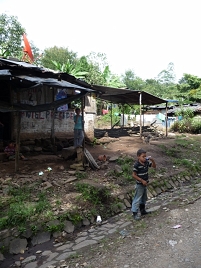
christian cummins
Sometimes we met a truck full of agricultural workers crammed like cattle into the open-roofed loading bay. This was a poor track to what should literally be "rich pickings". We were headed up to the growing areas for a high quality arabica coffee bean that is so prized on the coffee market of New York that, like oil, it is known as 'black gold'. But it was already obvious that not much of the wealth had trickled back down to the producers.
The farmers shacks, which peeped shyly out from the thick undergrowth, were made of ill-fitting wooden planks and tin roofs. The gaps between the boards made them look forlorn. Their open doors revealed bare austere interiors. Half way up a hill, a pig was tethered to a trunk by the side of the road. Every now and again a line of colourful washing was stretched between two trees, hinting at more houses hidden in the bushes.
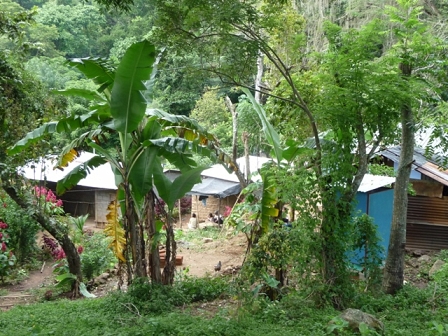
christian cummins
T-shirts reading “Vote Daniel: love, peace and life!”
It was the last few days before an election that would see populist president Daniel Ortega returned to power after a constitutional ban on him serving another term was overturned. He seemed popular here, or at least his election machinery was well oiled. Several huts were emblazoned with the red and black colours of his Sandinista party, the FSLN. Slogans were scrawled on the walls in black graffiti. Ortega has been bedevilled by allegations of authoritarianism, large-scale corruption, skirting of the democratic process, and of even of the sexual assault of his own step-daughter, but who has nonetheless cultivated the image of a champion of the poor and, in the days before the election, was feted by organised bus-loads of young supporters wearing T-shirts reading “Vote Daniel: love, peace and life!”
The rallies had looked completely stage managed. I suspected the screaming kids on the buses were being paid to attend, but Ortega has won genuine support with his leftist parties literacy programmes, land titles for lower-income families, cheap rural housing projects and fuel subsidies for taxi drivers - a largesse facilitated by his cosy friendship with the now ailing Venezuelan leader Hugo Chavez. Economist Nestor Avendano says Ortega is the "only president" to have ever cared about the poor."
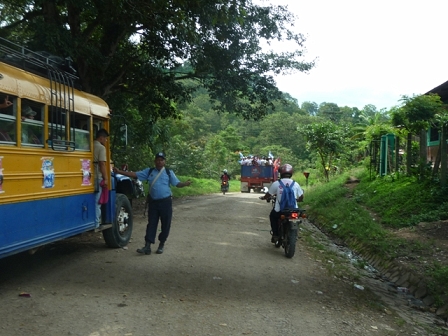
christian cummins
A huge wealth gap
But Ortega, a former Marxist who nowadays courts the powerful Catholic Church, is also popular with the rich business elite for his hands-off approach that critics say deprive the social institutions of well-needed tax revenue. There´s a huge wealth gap. 65% of the 5.7 million Nicaraguans live below the official poverty line with a staggering 35% of the rural population of Nicaragua surviving on less that 60 US cents a day. These impoverished campensinos are called as "los miserables" by their own government. Nestor Avendano says the rural coffee farmers need to modernise their production methods. But with what?
Now successfully re-elected on the back of election cookies, it`s time to see if Daniel Ortega, the former fatigue-clad guerrilla who has turned white-shirt wearing self-styled father of the nation, can really deliver to the poor.
The coffee growing area above the town of Matagalpa is one of the poorest areas of this poorest country in Central America. Many of the pueblos still lack electricity and doctors complain that the repetitive diet of beans and rice is impacting children`s growth and development. The New York Times describes Nicaraguan education levels as "anaemic".
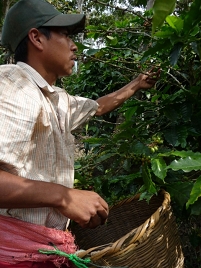
christian cummins
The Black Gold
Coffee has been Nicaragua`s most important export for a century and a half. The revolution in Nicaragua, following a decades long guerrilla campaign in the mountains above Matagalpa, has often been characterised as a coffee war since it was land-right grievances that helped provide the rebellion`s momentum. The rural poor, many of them landless coffee pickers, made up the back bone of the original guerrilla force of Augusto Cesar Sandino, and were also the foot soldiers for the leftist revolution when it finally came on July 19th 1979. Before the revolution the family of dictator Anastasio Somoza Debayle controlled thirty percent of all arable land and much of the rest was in the hands of his cronies or powerful coffee barons. With the revolution came land redistribution. Now many campensinos in the mountains north of Matagalpa are proud owners of their own small scale coffee farm, of an average size of between 3 and 5 hectares, but, even when they organised into cooperatives, they are losing the war against poverty.
Fair Trade
The fair trade system, which I`d come to study, is aimed at giving the farmer`s a fighting chance in that war. The labelling scheme describes itself as "a trading partnership" that focuses on sustainable development for poorer producers, "by providing better trading conditions and raising awareness of their situation". The project doesn't bring them great wealth, but it does cushion them from the whims of the coffee markets by guaranteeing them a minimum price for their coffee even at times of global price slumps. The system also gives farmers cooperatives a premium which they can decide to use on social projects or reinvest in their farms.
But does it really work?
Do the farmers really adhere to the social and ecological standards? Consumer`s faith in the system was rocked by an article that appeared in the Financial Times in 2006 called "The bitter cost of ‘fair-trade’ coffee". A journalist called Hal Weitzman uncovered apparent systematic failings with the certification process system on coffee farms in Peru. On four out of the five fair-trade certified farms that he visited the farmers were paying casual labourers less than the minimum wage. Weitzman suggested that the "capacity of certifiers to ensure their standards are met has not kept up with the growing demand for ‘ethical’ coffee."
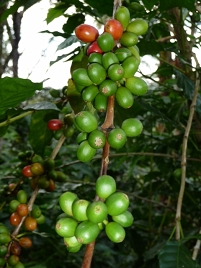
christian cummins
As we visited a farm in the cloud forest above Matagalpa, Fairtrade Austria`s Hartwig Kirner insisted that we can be pretty sure that when we choose to fork out that little bit extra for ethical coffee we are getting what we pay for. There will always be black sheep in what has become a massive global programme. The fair trade project was devised in Bonn in Germany but its ideologists were determined from the outset that the scheme shouldn't be a matter of the global North dictating to the global South. The audits are carried out by representatives in the producing nations - people who know the producing country and culture well. There is obviously scope in such a system for abuses to slip through the net that can damage the projects reputation, but Kirner insists that those are the exceptions. He's also in the rare position of wishing himself out of a job. Ethically labelled foodstuffs remain a niche market but its ideas have caught on in the mainstream with certain products like bananas. Kirmann says he dreams of the day when all trade is "fair".
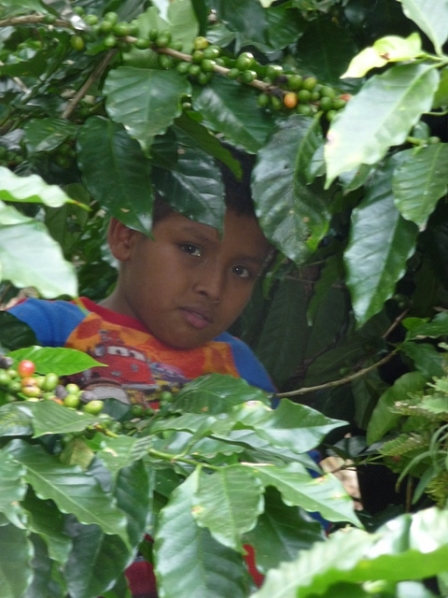
christian cummins
And how has the scheme changed lives in the producing area? Well on this Saturday's Reality Check Special on the "Origins of Our Coffee" I meet the Nicaraguans involved in picking, processing, drying and even tasting the coffee that might well fill your espresso machine. Brew one up for yourself and tune in - this Saturday, November 26th at 12 noon.
Dieses Element ist nicht mehr verfügbar


